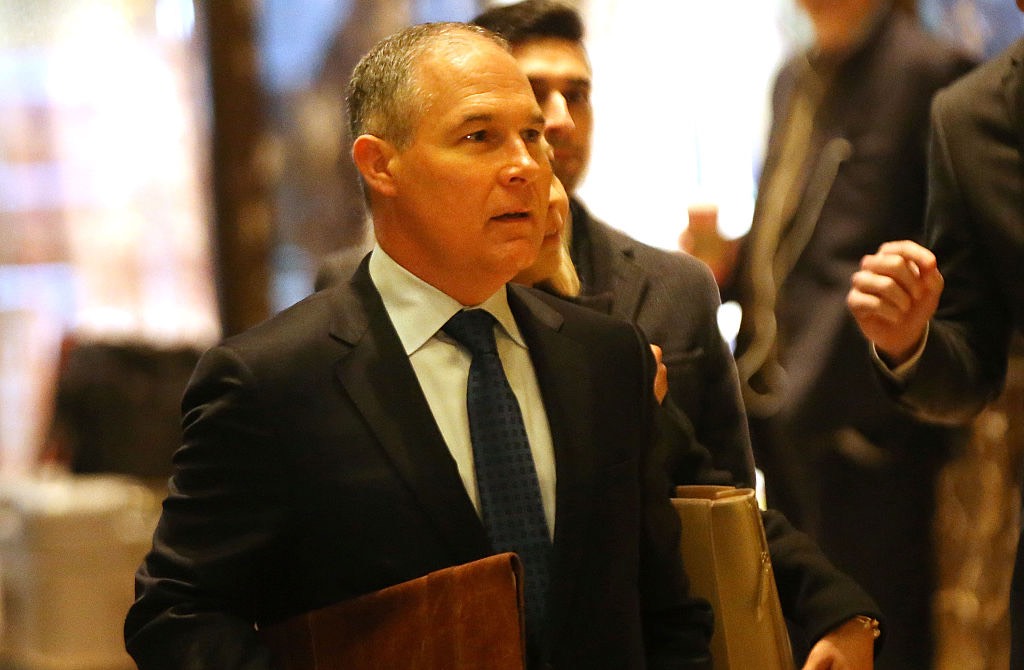What Does 2017 Hold for Climate Change Policy?

President-Elect Donald Trump has said that "nobody really knows" if climate change is real. His nominee for the head of the Environmental Protection Agency is a noted climate skeptic. And his transition team has created a questionnaire for the Energy Department asking which employees have taken part in international climate negotiations and which programs are crucial for meeting President Barack Obama's climate goals.
Given this drumbeat of news, climate scientists are worried. They're blogging about the death threats they've received over their work. They're warning about threats to future research funding. Some are even backing up public data on private servers because they fear that the Trump administration might cut the cord on federal climate research programs, The Washington Post reported. [The Year in Climate Change: 2016's Most Depressing Stories]
There are limits to what a president can do, however, and Trump's position on climate change hasn't always been consistent. On Dec. 11, for example, he told "Fox News Sunday" that he wasn't sure what he'd do about the Paris Agreement, an international pact that aims to keep warming below 2 degrees Celsius (3.5 degrees Fahrenheit).
In other words, a Trump administration could do serious damage to climate research and policy — and even a few years of dithering could have real effects on things like drought and sea level rise, climate scientists say. Given Trump's public statements and cabinet picks, few climate experts are optimistic that his administration will be friendly to the regulation of greenhouse gases. However, there is some economic and local momentum toward cleaner energy sources.
"I think local and state leadership will continue to be the beacon of light moving forward," said Sarah Myhre, an oceanographer and climate scientist at the University of Washington in Seattle.
Happening now
The overall mood in the climate science community is grim. After years of warning that the planet is warming, researchers are becoming increasingly outspoken about the effects already being seen. Average temperatures have risen by about 0.85 degrees Celsius (1.5 degrees Fahrenheit) over preindustrial norms, according to the Intergovernmental Panel on Climate Change. The Arctic is warming twice as fast as the rest of the globe, and scientists say Arctic sea ice will vanish during summertime by the middle of the century. At the other pole, the West Antarctic Ice Sheet is threatening to collapse, which could have major impacts on sea level rise.
"Our actions over the next four years will continue to alter the planet permanently," Myhre told Live Science. "We're talking about changing the entire planet forever. These are really serious, huge problems. They are not an abstraction." [8 Ways Global Warming Is Already Changing the World]
Get the world’s most fascinating discoveries delivered straight to your inbox.
Researchers are also becoming less reluctant to attribute weather events to climate change. The California drought of 2014 was partially due to greenhouse gas warming, according to a report in the journal Proceedings of the National Academy of Sciences. And when 22 separate research teams analyzed data over five droughts and heat waves in 2013, they found evidence of climate change's impact on all of them.
Climate change raises the risk of unusual and extreme weather, scientists say. A common analogy is the use of steroids in baseball. It's hard to attribute any one home run to a player's steroid use, but the player is going to hit more balls out of the park overall.
"Realistically, we only have a few years to act if we are to limit warming below catastrophic" levels, Michael E. Mann, an atmospheric scientist at Pennsylvania State University, told Live Science.
Climate scientists consider 2 degrees C (3.5 degrees Fahrenheit) a dangerous level of warming that would send sea levels up by meters rather than feet, increase severe droughts and make some areas along the equator unlivable, Mann said. (Some scientists think even 2 degrees is too much — researcher and climate activist James Hansen has argued that even that level of warming will inundate coastlines and alter the environment irreversibly).
Climate pessimism
In this game of degrees, a single administration's policy could have a big impact. Trump could withdraw from the Paris Agreement, in which the U.S. pledged to reduce its greenhouse gas emissions to 28 percent of its 2005 levels by 2025. A Republican-controlled Congress, paired with a climate-skeptical administration, could also damage fundamental climate research in the United States. In November, Trump adviser Bob Walker said that NASA should not be funded to do "politically correct environmental monitoring" of Earth and should instead focus on deep space. The statement frightened climate researchers, who use data from NASA satellites to monitor environmental changes. It also struck many as absurd.
"I think we're aghast, honestly, that we would even politicize the observation of Earth or that we would differentiate it from planetary science because climate science is planetary science," Myhre said. It's impossible to understand the climate of other planets without understanding how Earth's climate works, she said.
Funding is a major concern for climate scientists, Myhre said. Others are worried that the Trump administration will literally wipe out climate data by cutting funding to the federal agencies that maintain it. This month, meteorologist and climate journalist Eric Holthaus began spearheading an effort to archive governmental climate data to nongovernmental servers, just in case.
"It's an extraordinary step to have to take, but we live in an extraordinary moment," Holthaus wrote in The Washington Post.
Also in The Washington Post, Mann warned against "McCarthyist attacks" (i.e., those that lack proper evidence) on individual climate scientists. Mann has been something of a lightning rod for politicians who are hostile to climate change, and has been investigated and sued multiple times. He was the victim of a fake anthrax attack and has received multiple death threats.
"Such threats could spike again under a president and Congress hostile to climate science," Mann wrote.
Legal wrangling
Trump's cabinet picks signal that his administration might try to roll back previous attempts to prevent climate change. His choice for Environmental Protection Agency (EPA) head, Oklahoma Attorney General Scott Pruitt, has filed several lawsuits against the agency, USA Today reported. One lawsuit was against the Obama administration's Clean Power Plan, which aims to cut carbon emissions from power plants. That initiative is currently on hold as the D.C. Circuit Court of Appeals reviews it, though some states are moving forward under its provisions. The other lawsuit, submitted in August, is an attempt to prevent the EPA from setting more stringent regulations on methane released from oil and gas drilling activities.
In this area, though, the Trump administration won't have free rein. Even as head of the EPA, Pruitt might struggle to undo the actions that the agency has already taken. Rescinding rules takes time and would inevitably be stalled by litigation, Harvard law school professor Jody Freeman wrote for the Harvard Law School Environmental Law Program. For example, the EPA determined in 2009 that carbon dioxide emissions endanger health and welfare and can thus be regulated under the Clean Air Act, Freeman wrote. That finding has already been put through the crucible of the courts and has been upheld. It would be "extremely difficult, if not impossible" to reverse that finding at this point, she wrote. [6 Unexpected Effects of Climate Change]
The Clean Power Plan itself could be at risk if the D.C. Circuit Court doesn't decide on the plan's legality before Trump's inauguration, Freeman wrote. In that case, the Department of Justice could remand the rule back to the EPA without a court decision, and then gut it. If, on the other hand, the D.C. Circuit Court strikes down the law, the Trump administration could choose not to defend it further, though some states and environmental organizations would likely attempt to appeal the D.C. court's decision to the Supreme Court, Freeman wrote. If the D.C. court upholds the law, the Trump administration might refuse to defend it when state or industry actors appeal to the Supreme Court. Either way, if Trump appoints a conservative justice to the Supreme Court, as he is expected to, the bench would likely strike down the rule.
Even so, Freeman wrote, the momentum of the Clean Power Plan might live on. Many states are already committing to their own plans to increase renewable energy and to reduce greenhouse gas emissions, she wrote. States can also file their own lawsuits to push the federal government for climate action, just as Pruitt and some fellow state attorneys general have filed lawsuits trying to halt regulations.
California Gov. Jerry Brown, speaking at the annual meeting of the American Geophysical Union in San Francisco on Dec. 14, committed to just this sort of local pushback.
"We've got the scientists; we've got the lawyers," Brown said, "and we're ready to fight."
Original article on Live Science.

Stephanie Pappas is a contributing writer for Live Science, covering topics ranging from geoscience to archaeology to the human brain and behavior. She was previously a senior writer for Live Science but is now a freelancer based in Denver, Colorado, and regularly contributes to Scientific American and The Monitor, the monthly magazine of the American Psychological Association. Stephanie received a bachelor's degree in psychology from the University of South Carolina and a graduate certificate in science communication from the University of California, Santa Cruz.


